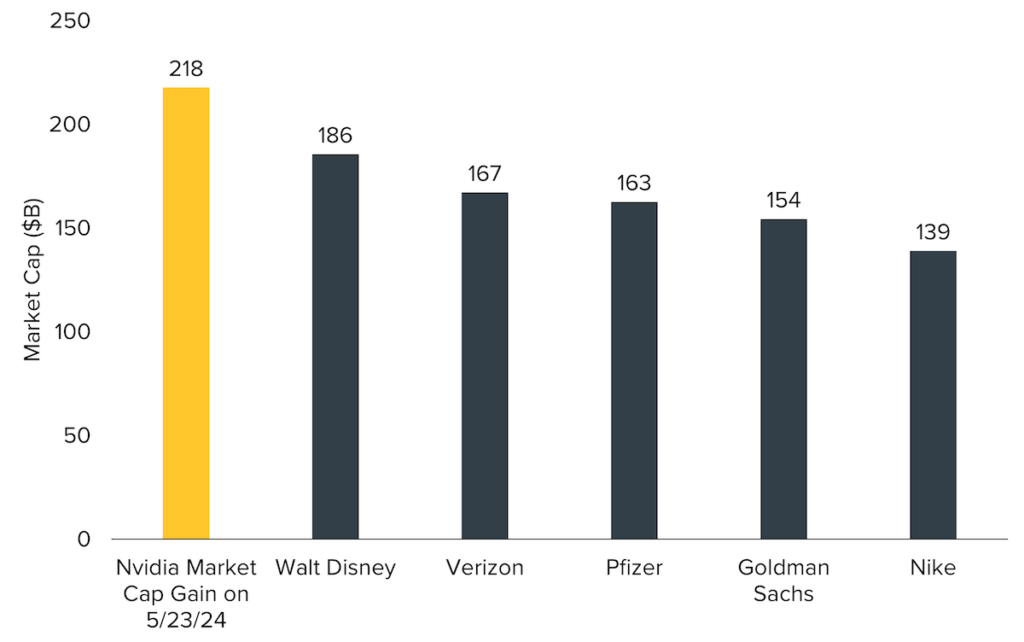Thanks to AI, it seems a bunch of people want Nvidia’s semiconductors.
Is it Nvidia’s world and we’re just living in it?
At least, that’s how it seemed to many investors last week. The artificial intelligence (AI) microchip company’s market capitalization soared by $218 billion—yep, that’s a “b”—in just one day, on the heels of yet another quarterly earnings blowout.
That brought its total market cap to $2.6 trillion, putting the Santa Clara, California-based company in third place behind Microsoft and Apple.
Even more amazing, as seen in the chart, that one-day, $218 billion jump in Nvidia’s market cap was greater than the total market cap of 470—or a whopping 93%—of the companies in the S&P 500 index (including giants such as Disney, Pfizer, and Nike).
Nvidia Market Cap Gain on May 23, 2024
Post Earnings vs. Total Market Caps of Some S&P 500 Companies

Source: Bloomberg, calculations by Horizon Investments. As of May 24, 2024. This is not a recommendation to buy or sell any security.
Nvidia, of course, has been at the heart of the artificial intelligence trend that has driven domestic markets since the start of 2023, when generative AI tools like chatGPT first gained popularity. For users to take advantage of these tools, cloud service providers such as Amazon (AWS), Microsoft (Azure), and Alphabet (Google Cloud) must provide a platform to host them. Those cloud services companies, in turn, need cutting-edge graphics cards and other chips to power their data centers.
Nvidia is currently the undisputed leader in this space, and its earnings call last week suggested that it will likely remain so for the foreseeable future.
Nvidia’s market-cap increase was the second-largest in a day by any U.S. company in history, according to Dow Jones Market Data. The largest? You guessed it: Nvidia, back in late February, with a nearly $277 billion one-day surge.
In the wake of investors’ continued infatuation with Nvidia, keep in mind that the S&P 500 is market-cap weighted—meaning that the largest stocks at any given moment have the biggest impact on the index’s performance. Therefore, owning a stock such as Nvidia could arguably become important to capture the market’s return; likewise, avoiding Nvidia could increase the risk of underperformance. That said, many other areas of potential opportunity remain that we continually assess as part of our approach to investment management.
The Standard and Poor’s 500, or simply the S&P 500, is a stock market index tracking the stock performance of 500 of the largest companies listed on stock exchanges in the United States. It is not possible to invest directly in an index. References to indices, or other measures of relative market performance over a specified period of time are provided for informational purposes only. Reference to an index does not imply that any account will achieve returns, volatility or other results similar to that index. The composition of an index may not reflect the manner in which a portfolio is constructed in relation to expected or achieved returns, portfolio guidelines, restrictions, sectors, correlations, concentrations, volatility or tracking error targets, all of which are subject to change. Information obtained from third party sources is believed reliable but has not been vetted by the firm or its personnel.
This commentary is written by Horizon Investments’ asset management team. Past performance is not indicative of future results. Nothing contained herein should be construed as an offer to sell or the solicitation of an offer to buy any security. This report does not attempt to examine all the facts and circumstances that may be relevant to any company, industry, or security mentioned herein. We are not soliciting any action based on this document. It is for the general information of clients of Horizon Investments, LLC (“Horizon”). This document does not constitute a personal recommendation or take into account the particular investment objectives, financial situations, or needs of individual clients. Before acting on any analysis, advice, or recommendation in this document, clients should consider whether the security in question is suitable for their particular circumstances and, if necessary, seek professional advice. Investors may realize losses on any investments. Asset allocation cannot eliminate the risk of fluctuating prices and uncertain returns. All investing involves the risk of loss.
The investments recommended by Horizon Investments are not guaranteed. There can be economic times when all investments are unfavorable and depreciate in value. Clients may lose money. This commentary is based on public information that we consider reliable, but we do not represent that it is accurate or complete, and it should not be relied on as such. The opinions expressed herein are our opinions as of the date of this document. These opinions may not be reflected in all of our strategies. We do not intend to and will not endeavor to update the information discussed in this document. No part of this document may be (i) copied, photocopied, or duplicated in any form by any means or (ii) redistributed without Horizon’s prior written consent. Forward-looking statements cannot be guaranteed. Other disclosure information is available at hinubrand.wpengine.com.
Horizon Investments and the Horizon H are registered trademarks of Horizon Investments, LLC
©2024 Horizon Investments, LLC.
